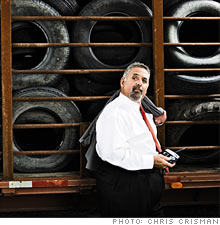A small company's secret: Pick big partners
An automotive-accessory maker thrives by teaming up with other small manufacturers.

(Fortune Small Business) -- The big guys do it all the time. Dell (DELL, Fortune 500) computers come packaged with Intel processors, and McDonald's (MCD, Fortune 500) serves Newman's Own salad dressing. For small businesses, strategic alliances can boost sales to new heights without supersizing staffs.
Advantage Pressure Pro, a 17-year-old company based in Harrisonville, Mo., had just five employees when owner Phillip Zaroor started to approach other automotive firms about pairing his tire-pressure-monitoring systems with their products. That was in 2006. Last year Zaroor's sales rose to $5 million, from $3 million the previous year. Headcount? Still five.
Advantage Pressure Pro had always partnered with larger firms. GE (GE, Fortune 500) makes the sensor chips that go into Zaroor's systems. Michigan-based Lectronix handles Advantage's assembling. But when Zaroor, 59, noticed that many customers sought a solution that combined fleet management, driver logs, and truck weighing with tire-pressure monitoring, he decided to pursue partnerships with a range of small technology providers.
He eventually signed up more than 30 affiliates, such as Square Rigger, a fleet-maintenance-software vendor in Silverdale, Wash., and Transmobile, a Florida-based tech company that sells asset-tracking applications.
"Small firms need collaborative relationships to compete," says Transmobile's CEO, Sherry Carani.
Zaroor agrees. "You don't buy a door without the knob," he says. "Our partners are the doors, and we're that feature that adds value." Advantage and Transmobile now offer packages that incorporate each other's products.
Zaroor prefers to keep his firm small and close-knit - three of his five employees are relatives. That size allows him direct contact with all staffers and keeps him in the loop when it comes to office buzz. Meanwhile, Zaroor's partnerships let him reach new markets without adding employees. "Instead of hiring our own sales force, our partners integrate our technology into their own product lines," he says. The result: thousands of points of sale and high margins.
Though Zaroor isn't overburdened by hiring and management issues, he chooses his partners with great care. Entrepreneurs commonly fear that larger partners will swipe their ideas.
Instead of giving in to paranoia, Zaroor invests heavily in his patents and vets his affiliates rigorously. He focuses on noncompetitive companies with business goals similar to his own.
"You can't stick your head in the sand," says Zaroor. But with some due diligence, you can use partnerships to drive big profits. ![]()
Outsized profits from tiny firms
Get customers to sell for you
Speed-dating for businesses
-
The Cheesecake Factory created smaller portions to survive the downturn. Play
-
A breeder of award-winning marijuana seeds is following the money and heading to the U.S. More
-
Most small businesses die within five years, but Amish businesses have a survival rate north of 90%. More
-
The 10 most popular franchise brands over the past decade -- and their failure rates. More
-
These firms are the last left in America making iconic products now in their twilight. More











